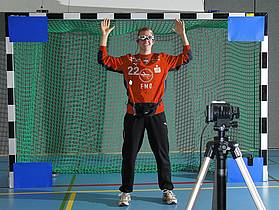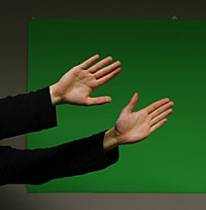VR Handball Trainer
Immersive virtual environments are interesting for a variety of application domains, one of which is sports. With the ability to provide users with controlled feedback, and measure user reactions with full-body tracking systems, virtual reality technologies can help in training applications, as well as to evaluate player performance.


Virtual reality handball goalkeeper trainer: (left) reactions measured in corners of goal, and
(right) fast detection of blocking in a corner by detecting color changes in camera streams.
In this project we developed a system for measuring reaction times of young goalkeepers in the domain of indoor handball. Previous approaches to this problem were based on light barriers that were set up in the corners of a handball goal, which could measure responses of a goalkeeper after seeing a player of the enemy team who takes a shot at one of the corners of the goal (via videos on a head-mounted display or projection wall). However, this approach has serious disadvantages, such as a possible adaptation of goalkeepers to the limitations of the light barriers, which do not require goalkeepers to perform natural blocking movements in order to break a light barrier.
Our solution to this problem consisted of utilizing a webcam mounted in front of a goal, as well as colored pads attached to the edges of the goal, such that we could easily and accurately determine blocking movements in one of the corners, i.e., the system reliably detected if a goalkeeper has blocked a large enough area of a corner of the goal.
The system was used for the professional analysis of players' motions and performance of handball goalkeepers in the youth national teams of the German Handball Federation and their talent identification, and as a simple and low-cost home-training environment for handball goalkeepers.
This segment from the german TV-show "Planetopia" shows the system in use: YouTube: Peripheres Sehen (in German).
This project was realized in cooperation with Dr. Jörg Schorer and Lennart Fischer from the Department of Sport Psychology at the University of Münster, Germany.
Note that this project was completed before the Microsoft Kinect came out, which now opens up a new and interesting perspective on such evaluation and training environments.
